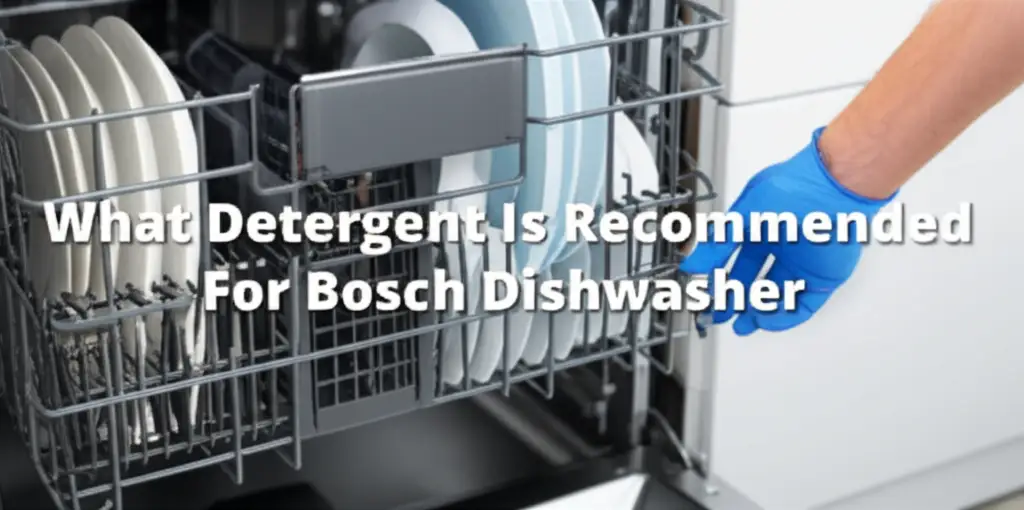· Mason Everett · Home Cleaning · 18 min read
What Detergent Is Recommended For Bosch Dishwasher

What Detergent is Recommended for Bosch Dishwashers?
You want your dishes sparkling clean. You want your Bosch dishwasher to work perfectly. The detergent you choose plays a big role in both outcomes. Picking the right detergent ensures effective cleaning. It also helps your appliance last longer. Many people wonder, “What detergent is recommended for Bosch dishwasher?” This is a good question. Using the wrong product can lead to cloudy dishes, residue, or even machine damage.
In this article, we will explore the best detergent options for Bosch dishwashers. We will discuss different detergent types like pods, liquids, and powders. You will learn about the importance of rinse aid. We will also cover how to handle hard water issues. Furthermore, we will highlight common detergent mistakes to avoid. Finally, we will provide tips to optimize your dishwasher’s performance. My goal is to help you achieve perfectly clean dishes every time.
Takeaway
Choosing the best detergent for your Bosch dishwasher makes a real difference. Here are the main points to remember:
- Always use automatic dishwasher detergent. Never use hand dish soap.
- Pods and tablets are often recommended. They offer convenience and pre-measured doses.
- Rinse aid is essential. It helps with drying and prevents spots.
- Consider water hardness. Adjust detergent type or add salt if you have hard water.
- Avoid common mistakes. Do not use too much detergent or the wrong kind.
Clear Answer to the Main Query
Bosch recommends using high-quality automatic dishwasher detergents for their dishwashers. These detergents are specifically formulated for dishwashers, producing low suds and effectively cleaning dishes. Bosch often suggests using detergent tablets or pods for optimal results due to their pre-measured convenience and balanced formulation for various water conditions.
Understanding Bosch’s Detergent Recommendations
Bosch designs its dishwashers for efficiency. These machines use less water and energy than many other brands. This unique design affects detergent choice. Bosch dishwashers need detergents that perform well in low-water environments. They also need detergents that do not create too many suds. Too many suds can cause cleaning issues. They can also overflow the machine.
The instruction manual for your specific Bosch model is your best guide. It usually gives clear advice on detergent types. Bosch generally advises against using hand dish soap. Hand soap creates excessive foam. This foam can damage the dishwasher. It can also lead to poor cleaning. I have seen this happen to many people who mistakenly use the wrong soap.
High-quality detergents help keep your dishwasher in good shape. They prevent mineral buildup inside the machine. This buildup can affect performance over time. Proper detergent use also ensures your dishes come out clean. They should be spotless and dry. Using a recommended detergent keeps your Bosch running efficiently. It also protects your investment.
Why Quality Matters for Bosch
High-quality detergents have powerful cleaning agents. They break down food particles effectively. They also dissolve grease and stains. Bosch dishwashers have advanced sensor technology. This technology detects soil levels. It adjusts the wash cycle accordingly. A good detergent works with these sensors. It helps the machine achieve the best results.
Some cheaper detergents might not dissolve completely. This can leave residue on your dishes. It can also leave residue inside the dishwasher. This residue can lead to odors or clogged parts. Your dishwasher’s longevity depends on proper care. Using the right detergent is a major part of that care. I always tell my friends to invest in good quality.
Furthermore, quality detergents often contain water softeners. This is helpful, especially if you have hard water. Hard water can cause mineral deposits. These deposits lead to cloudy glasses and white spots. The right detergent helps counteract these effects. It ensures your dishes remain clear and shiny. This attention to detail makes a real difference in the long run.
The Best Detergent Types for Bosch Dishwashers
Choosing the right form of detergent is important for your Bosch dishwasher. Each type—pods, liquids, and powders—has its own benefits. They also have specific considerations for Bosch models. Bosch dishwashers are known for their quiet operation and effective cleaning. The right detergent helps them perform at their peak. You want to pick the option that best suits your habits and water conditions.
I personally find that certain types work better for different needs. For example, if you live in an area with very hard water, you might prefer a powder. This allows you to adjust the dosage. If you value convenience, pods are often the way to go. Let’s look at each type more closely.
Dishwasher Pods and Tablets
Dishwasher pods, or tablets, are very popular. They are pre-measured doses of detergent. You just place one pod in the dispenser. This removes the guesswork from dosing. Bosch often recommends using these for consistent results. They contain a mix of detergent, rinse aid, and sometimes salt. This “all-in-one” solution simplifies your routine.
Pods dissolve quickly during the wash cycle. They release their cleaning agents evenly. This ensures effective cleaning for various dish loads. Many users report excellent results with major brands of pods. These include Finish Quantum, Cascade Platinum, and Fairy Platinum. I use them often, and my dishes always come out sparkling. If you are wondering where to buy dishwasher pods, they are widely available in most supermarkets and online stores.
However, remember that pods are not adjustable. You cannot use less for a small load. You also cannot use more for a very dirty load. This usually is not a problem for Bosch dishwashers. Their sensors adapt to the load. But it is something to keep in mind. Always ensure the pod compartment is dry before loading the pod. This prevents early dissolving.
Liquid Dishwasher Detergent
Liquid detergents are another option for your Bosch. They offer flexibility in dosing. You can adjust the amount based on the load size. You can also adjust it based on how dirty your dishes are. This can be beneficial for specific cleaning needs. Liquid detergents are generally easy to pour into the dispenser.
However, liquid detergents often contain more water. This means they may be less concentrated than powders or pods. Some liquid detergents might also contain dyes or fragrances. These can leave a film on dishes or inside the dishwasher. You should always look for a high-quality, clear liquid detergent. Choose one designed for automatic dishwashers.
Liquids can sometimes leave a sticky residue in the dispenser. This can be annoying. Make sure to clean your dispenser regularly. This ensures proper detergent release. While they offer flexibility, I find them less convenient than pods. They require more careful measurement.
Powder Dishwasher Detergent
Powder detergents are traditional. They are often the most economical choice. Like liquids, powders allow you to adjust the dosage. This makes them good for areas with hard water. You can increase the amount of powder to combat mineral deposits. This helps get your dishes cleaner.
The biggest downside of powder is its tendency to clump. This can happen if exposed to moisture. Clumped powder might not dissolve properly. It can leave gritty residue on dishes. Always store powder detergent in a dry, airtight container. This keeps it fresh and free-flowing.
Some powder detergents can also be abrasive. Over time, this might slightly dull certain types of glassware. It is less common with modern formulations. Still, it is something to consider. For Bosch dishwashers, if you choose powder, make sure it is a high-quality, fine powder. This ensures it dissolves completely. I find them very effective for stubborn stains.
The Role of Rinse Aid in Bosch Dishwashers
Rinse aid is not just an optional extra for your Bosch dishwasher; it is a critical component for achieving truly spotless and dry dishes. Many people overlook its importance. I always emphasize its use to anyone with a dishwasher, especially a Bosch. Bosch dishwashers are designed to work optimally with rinse aid. It helps in several ways that detergent alone cannot.
Rinse aid works by reducing the surface tension of water. This makes water droplets spread out. They form a thin sheet instead of individual beads. This sheeting action prevents water spots. It also promotes faster drying. Without rinse aid, water can cling to dishes and glasses. This leaves behind mineral deposits as the water evaporates. This is why you might see cloudy glasses even after a wash.
Bosch dishwashers often use condensation drying. They do not have a visible heating element in the tub. The final hot rinse heats the dishes themselves. Then, the cool stainless steel interior attracts moisture. Rinse aid helps this process significantly. It ensures water beads roll off the dishes quickly. This allows them to dry much better. For instance, understanding does Bosch dishwasher heat its own water helps clarify why rinse aid is so vital for the drying phase.
How to Use Rinse Aid
Your Bosch dishwasher has a specific rinse aid dispenser. It is usually located near the detergent dispenser. You fill this compartment with liquid rinse aid. The dishwasher releases a small amount during the final rinse cycle. The dispenser typically holds enough for several cycles. Your dishwasher often has an indicator light. This light tells you when to refill the rinse aid.
You can also adjust the rinse aid dosage on most Bosch models. If you see streaks, you might be using too much. If you see spots, you might need more. Experiment with the settings to find the right balance for your water. Using the correct amount ensures perfect results every time. I find it saves me time not having to re-wipe dishes.
Good quality rinse aid also helps prevent odor buildup in your dishwasher. It ensures no sticky residue is left behind. This keeps your dishwasher fresh. Combined with regular cleaning, rinse aid makes a big difference. For instance, regular maintenance like knowing how often should you clean your dishwasher filter along with consistent rinse aid use keeps your appliance running well.
Dealing with Hard Water and Bosch Dishwashers
Hard water is a common issue in many regions. It contains high levels of dissolved minerals. These minerals include calcium and magnesium. Hard water can cause several problems for your Bosch dishwasher. It leaves white spots and cloudy film on dishes. It can also lead to scale buildup inside the machine. This buildup affects efficiency and lifespan.
Bosch dishwashers, like all dishwashers, can struggle with hard water. The minerals interfere with detergent performance. They prevent proper sudsing and cleaning. They also contribute to poor drying. I live in an area with hard water, so I know this problem well. Addressing hard water is key to getting the best results from your Bosch.
One of the most effective solutions is a built-in water softener. Many Bosch dishwashers, especially European models, include this feature. This system adds salt to soften the water before it enters the wash cycle. If your Bosch has this feature, you must regularly add dishwasher salt. This is different from table salt. Dishwasher salt regenerates the softener.
Strategies for Hard Water
If your Bosch does not have a built-in softener, you still have options. Consider using a detergent specifically formulated for hard water. These detergents often contain extra water softeners. They help neutralize minerals. Brands like Finish Quantum and Cascade Platinum offer hard water variants. Always check the product label.
Another strategy is to increase your detergent dosage. For powder detergents, you can add a bit more. For pods, this is not possible. However, be careful not to overdose. Too much detergent can cause excessive sudsing. It can also leave residue. This requires a delicate balance.
Adding a rinse aid is even more important with hard water. It helps water sheet off dishes. This reduces water spots. You might need to increase your rinse aid setting. Adjust it until you see no spots. Using white vinegar can also help as an occasional booster. For information on where to put vinegar in dishwasher to clean, that article covers helpful tips. Using where to put vinegar in dishwasher to clean can be a temporary solution or a cleaning aid.
Regular cleaning of your dishwasher is vital too. Hard water leads to more mineral buildup. Running a cleaning cycle monthly helps. You can use a dishwasher cleaner or vinegar. This prevents scale from impacting performance. For example, knowing how to run clean cycle on Bosch dishwasher ensures your machine stays clear of mineral deposits.
Common Detergent Mistakes to Avoid with Your Bosch
Using the wrong detergent, or using it incorrectly, can lead to poor results. It can also cause problems for your Bosch dishwasher. I often see people make simple mistakes that harm their appliance. Avoiding these common errors ensures your dishwasher runs efficiently. It also keeps your dishes spotless. Let’s look at what to watch out for.
One of the biggest mistakes is using hand dish soap. Hand soap creates an enormous amount of suds. This is because it is designed to foam heavily for manual dishwashing. Dishwashers are not designed for this. The suds can fill the entire tub. They can even overflow onto your kitchen floor. This can damage your machine and your flooring. If you ever put Dawn or similar hand soap in your dishwasher by accident, you need to know what to do if you put Dawn in dishwasher immediately.
Another common mistake is using too much detergent. More detergent does not mean cleaner dishes. Instead, it can lead to excessive suds. It can also cause a residue film on your dishes and inside the dishwasher. This film makes glasses appear cloudy. It makes dishes feel greasy. Always follow the manufacturer’s recommendations for dosing. For pods, it’s one pod per load. For powders and liquids, consult the instructions or fill lines.
Other Mistakes and Solutions
Not storing detergent properly is another issue. Powder detergents can clump if they get wet. This prevents them from dissolving properly during the wash. Always keep powder in a dry, airtight container. Pods can also stick together or dissolve prematurely if exposed to moisture. Keep them in their original packaging. Close the lid tightly after each use.
Ignoring the rinse aid dispenser is also a mistake. We discussed the importance of rinse aid earlier. Running your Bosch without it will result in wet dishes and spots. Always keep the rinse aid dispenser filled. Check it regularly, especially if your dishes are not drying well. If your Bosch is not drying well, similar issues to why is my KitchenAid dishwasher not drying can be solved by addressing rinse aid levels.
Finally, do not assume all dishwasher detergents are the same. Lower quality detergents might not clean as effectively. They might leave more residue. They could also contribute to buildup inside your machine. Investing in a good quality detergent is worth it. It protects your Bosch and ensures clean dishes. I always recommend using reputable brands.
Optimizing Your Bosch Dishwasher’s Cleaning Performance
Using the right detergent is a great start. However, achieving truly sparkling dishes from your Bosch dishwasher involves more. Several factors work together to ensure optimal cleaning. Neglecting these can lead to disappointing results. Even the best detergent cannot fix everything. I have found that a holistic approach works best.
Proper loading is extremely important. Do not overcrowd your dishwasher. Dishes need space for water and detergent to reach all surfaces. Place items so they do not block spray arms. Face dirtier sides towards the spray arms. Bowls and cups go upside down. Plates stand upright. This ensures everything gets cleaned evenly.
Pre-rinsing dishes is often unnecessary with Bosch dishwashers. Modern detergents are designed to work with food particles. Over-rinsing can actually be counterproductive. It removes the “food” that detergent enzymes need to cling to and break down. Scrape off large food scraps instead. This saves water and energy. It also helps the detergent work as intended.
Maintenance and Cycle Selection
Regular maintenance of your Bosch dishwasher is crucial. The filter collects food particles. A dirty filter can cause poor cleaning results. It can also lead to unpleasant odors. You should clean your dishwasher filter regularly. For details, check out how often should you clean your dishwasher filter. This simple task keeps your dishwasher performing well.
Running regular cleaning cycles also helps. These cycles flush out grease and mineral buildup. You can use a dedicated dishwasher cleaner. Alternatively, run an empty cycle with a cup of white vinegar. This keeps the interior fresh. It prevents your dishwasher from smelling bad. Issues like why does my GE dishwasher smell can often be resolved with better cleaning habits, which apply to Bosch too.
Choose the right wash cycle for your load. Bosch dishwashers offer various cycles. These include Auto, Heavy, Normal, and Express. The Auto cycle uses sensors to detect soil levels. It adjusts water temperature and cycle length. For very dirty pots, use the Heavy cycle. For everyday loads, Normal or Auto usually works well. Selecting the appropriate cycle ensures effective cleaning without wasting resources.
Specialty Detergents and Additives for Bosch Owners
Beyond standard detergents, there are specialty products for your Bosch dishwasher. These products address specific cleaning challenges. They can enhance your dishwasher’s performance. Knowing about them can solve particular problems you might encounter. I sometimes use these for extra care or when faced with stubborn issues.
One common additive is dishwasher salt. As mentioned earlier, many Bosch models have a built-in water softener. If yours does, you must use dishwasher salt. This salt recharges the softener. It helps combat hard water effects. It prevents limescale buildup inside the machine. This ensures your dishes come out spotless, even with very hard water. Remember, this is not table salt; it is a coarse-grain salt specifically for dishwashers.
Dishwasher cleaners are also specialty products. They remove grease, grime, and mineral deposits from the dishwasher’s interior. Over time, residue can build up. This affects cleaning performance. It can also cause odors. You can use liquid or tablet cleaners. Run them on an empty cycle. Using a cleaner monthly helps maintain your Bosch. It keeps it fresh and clean inside.
Addressing Specific Needs
Some people prefer “natural” or “eco-friendly” detergents. These detergents use plant-based ingredients. They are free of phosphates and chlorine. If environmental impact is a concern, these are good options. Brands like Seventh Generation and Ecover offer these products. Check their effectiveness for your water type. They might perform differently than conventional detergents.
For tackling tough stains or odors, you can use boosters. Some boosters are enzyme-based. They help break down stubborn food residues. Others are oxygen-based. They help remove coffee or tea stains. Add these alongside your regular detergent. They provide an extra cleaning punch. They can be very useful for challenging loads.
Descalers are another specialty product. They specifically target limescale buildup. If you have very hard water and notice significant scale, a descaler can help. It dissolves mineral deposits. This restores your dishwasher’s efficiency. Use them periodically as directed. Remember, the goal is to keep your Bosch running like new. These specialty products are tools to help you achieve that.
FAQ Section
Q1: Can I use regular dish soap in my Bosch dishwasher?
A1: No, absolutely not. Regular hand dish soap creates excessive suds. This can cause severe overflowing and damage to your Bosch dishwasher. Always use automatic dishwasher detergent specifically designed for dishwashers. Using the wrong soap can create a huge mess and potentially ruin your appliance.
Q2: How often should I add rinse aid to my Bosch dishwasher?
A2: You should add rinse aid whenever the rinse aid indicator light on your Bosch dishwasher illuminates. The frequency depends on how often you run your dishwasher and the rinse aid setting. For most users, this means refilling the dispenser approximately once a month or every few weeks.
Q3: Why are my dishes still wet after a Bosch dishwasher cycle?
A3: Bosch dishwashers often use condensation drying, which requires rinse aid for optimal results. If dishes are wet, check your rinse aid dispenser and refill it if empty. Also, ensure the rinse aid setting is appropriate for your water hardness. Proper loading and using the right cycle can also help.
Q4: My Bosch dishwasher leaves a white film on my dishes. What can I do?
A4: A white film usually indicates hard water issues or too much detergent. If you have hard water, use a detergent designed for it, consider adding dishwasher salt, and increase rinse aid. If using too much detergent, reduce the amount. Also, run a dishwasher cleaner cycle.
Q5: Is powder, liquid, or pod detergent best for Bosch?
A5: Bosch generally recommends using high-quality detergent tablets or pods for convenience and consistent results. These often contain all-in-one formulations. Liquid and powder detergents are also suitable. However, they require careful dosing. The best choice depends on your water hardness and preference for convenience.
Q6: Can I use dishwasher cleaning tablets regularly in my Bosch?
A6: Yes, you can. Using dishwasher cleaning tablets monthly or every few months is a good practice. They help remove grease, grime, and mineral buildup inside your Bosch dishwasher. This keeps the machine running efficiently and prevents odors. Always follow the cleaner’s instructions.
Conclusion
Choosing the right detergent for your Bosch dishwasher is essential. It leads to sparkling clean dishes. It also helps extend the life of your appliance. We have explored the best options, from convenient pods to adjustable powders. We also discussed why rinse aid is vital for spotless, dry dishes. Remember, your Bosch is a precision machine. It thrives on specific care.
Always choose high-quality automatic dishwasher detergent. Never use hand soap. Adjust your detergent and rinse aid based on your water hardness. Pay attention to how you load your dishes. Clean your dishwasher regularly, especially the filter. These steps ensure optimal performance. My goal is to help you get the most from your investment.
By following these guidelines, you will enjoy consistently brilliant results. Your dishes will be clean, and your Bosch dishwasher will operate smoothly for years. Happy dishwashing!
- Bosch Dishwasher Detergent
- Dishwasher Detergent
- Bosch Dishwasher Care
- Dishwasher Cleaning Tips
- Recommended Detergent
- Dishwasher Pods
- Hard Water Solutions





